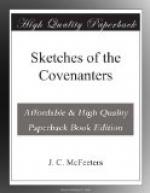The women often showed fidelity to Jesus Christ and His Covenant that amazed the persecutors. They scorned the suggestion of relief for themselves or their families that would compromise the truth of Christ. John Welch, of Ayr, lay in prison fifteen months because his preaching did not please the king. The dungeon in which he was confined is yet pointed out in Blackness Castle, a dark, dismal, pestilential vault. A recent traveler said that he had gotten enough of its horrors in five minutes to do him. But poor Welch had to abide there “five quarters of ane yier.” Mrs. Welch visited the king in person to plead for his release. “Yes,” said the king, “if he will submit to the bishops.” “Please Your Majesty,” said Mrs. Welch, holding up the corners of her apron, “I’d rather kep his head here.” The faithful wife was willing to witness her husband’s execution, rather than have him betray the cause of Christ or break his Covenant with God.
Many a martyr got his inspiration for duty from God, through his noble wife. When James Guthrie came to a difficult task, he seemed to hesitate. Great interests were involved. May he not modify a certain ministerial action so as to save his life, provide for his family, and continue to shepherd his flock? Who would not pause in presence of such a serious consideration? His wife, observing his perplexity, came into his presence with a cheery countenance and an assuring voice, saying, “My heart, what the Lord gives you light and clearness to do, that do.” The light carried him into the service; the conscience was set free from the temporary disturbance; yet the decision brought him to the scaffold; it placed upon his brow the martyr’s crown. The worthy wife sadly went into widowhood, and the children into orphanage, through that strong, womanly spirit which could brook no deviation from duty.
The women frequently were placed in embarrassing positions. In marriage they were not always equally yoked. When the husband was a persecutor, faithfulness in the house and fidelity to Jesus required the highest wisdom on the part of the wife. Lady Anne Rothes occupied such a home. Both she and her husband were born Covenanters. The Covenant principles were bred in the bone, instilled into the thoughts, and impressed on the conscience, at the parental fireside, at the family altar, in the house of God, and at the Table of the Lord, while they were under the care of their parents; but the young man forsook his father’s God, dishonored the Covenant, and cast off religion. He became a profligate and persecutor. The woman, through the abundant grace of God, remained true to the Covenant. Her position, however, involved her in many a dilemma. The wedlock that promised to be a blessed union proved to be a galling yoke. The husband was placed in power by the king, and granted the title of duke. On one occasion, when entertaining Archbishop Sharp, the two grew merry over their plan to put certain Covenanters to death. The tender-hearted




